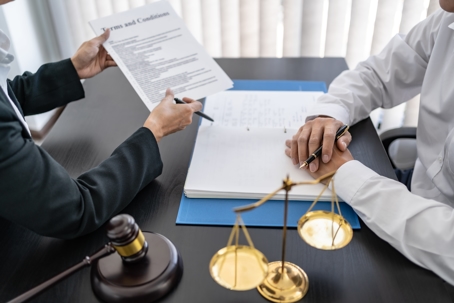Has your spouse suddenly start sprucing up? Has he or she start spending more time at work? Have George Strait and Shania Twain kicked Perry Como and Barry Manilow off the playlist? Did those quick trips to Wal-Mart begin to last three hours? Although painful, you have admitted your spouse is having an affair, and it's time for a divorce. But be careful! Those hints may not be enough to prove adultery in court in Texas.
Before you even go to court, you should know that Texas is a “no fault” divorce state, meaning whichever spouse filing for divorce does so on the grounds of “irreconcilable differences,” with neither party blaming the other for ending the marriage. It's relatively fast, inexpensive, and the judge awards each party as close to half of the marital property as possible. However, if you really want the records to show your spouse's affair was the reason your marriage ended, you're now filing a “fault” divorce, and the ball is in your court. The burden of proof is completely up to you.
This is where things get tricky. In Texas, the definition of adultery is voluntary sexual intercourse of a married person with one not the spouse. How do you prove that? All those little things that led you to discover the affair in the first place won't help you here. You have to produce concrete evidence, such as photographs of the couple engaged in intercourse or eyewitness testimony. You could hire a private investigator, but that could become costly. Though the idea of taking such intimate photographs could be distasteful, you might be tempted to become an amateur sleuth and start collecting your own evidence.
However, a wiser move would be to consult an attorney. There is a fine line between what you can do legally to get that evidence and what could get you into trouble. An attorney could keep you on the right side of that line. He or she knows how to begin preparing a case made up of evidence legally available. Phone records and email accounts can prove a pattern of communication. Credit card statements and bank statements may provide evidence of unusual purchases of gifts, dinners, or even vacations. All this evidence comes from accounts available to both spouses. While not concrete, this information may be used to strengthen a case, and you should let the attorney do his or her job with it. But if you decide to strike out on your own, you should talk to your attorney first to make sure you don't cross that line and end up in trouble.
There are federal and state laws that protect an individual's right to privacy. If you break any of these laws, you could face civil penalties. Your spouse could even sue you for invasion of privacy. For example, Texas surveillance laws prevent you from the use of tracking devices or wire tapping without the other person's consent. Surveillance laws also prohibit the interception of private emails, phone, fax, or text messages. However, once an email has been sent, copies of it may be downloaded from something like a family computer. Much of the common, easily acquired “proof” could be illegal. It might be better to let your attorney handle everything in the long run. Knowing federal and state laws is his or her job.
Then, if you win, judges in Texas do not view adultery as something that should play a predominant role in their decisions. But they do have a great deal of discretion in their ruling. You may receive a larger amount of marital property based on money spent during the affair. In awarding child custody, the judge will consider the best interest of the child, thinking about who or what he or she may have been exposed to during and even after the affair.
There is no sure thing when it comes to a fault divorce for adultery in Texas. So why do it? Maybe just to let the cheater know he or she is busted!

